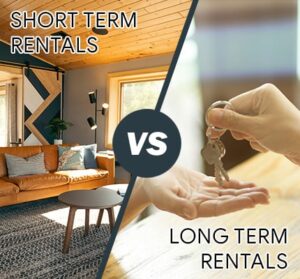As a property owner in Cyprus, one of the most important decisions you’ll face is whether to offer your property as a short-term rental (STR) or a long-term rental (LTR).
Both options offer unique benefits and challenges, and the right choice largely depends on your financial goals, desired level of involvement, and personal circumstances. Whether you’re seeking a steady income stream or aiming for higher returns, it’s essential that your decision aligns with your priorities.
At STAY Short Lets, we specialize in managing short-term rentals, but we believe in offering honest, balanced advice. Every property owner has different needs and levels of patience, so it’s important to choose the rental model that suits you best.

Income Potential
Short-Term Rentals (STR):
Short-term rentals often deliver higher revenue potential, especially in Cyprus’ popular tourist hotspots like Ayia Napa, Paphos, and Protaras.
When managed effectively, STRs can outperform long-term rentals during peak seasons, with dynamic pricing strategies adjusting rates according to market demand. Cities like Nicosia, Larnaka, and Limassol also maintain strong year-round occupancy rates — averaging 70% or more — thanks to business travelers and digital nomads.
If you understand the market and have patience with the fluctuations of short-term rentals, tailoring your property’s rates to market demand can provide consistent income throughout the year.
Long-Term Rentals (LTR):
Long-term rentals provide a stable, predictable income stream. With tenants typically staying six months or longer, owners enjoy the peace of mind of steady rental payments.
However, long-term rental yields are often lower than a well-managed STR, especially in high-demand areas. Risks such as late payments, disputes, and extended vacancy periods must also be considered. When tenants vacate, properties can remain unrented for months, resulting in income loss and additional repair costs.
Key Takeaway:
Short-term rentals offer the potential for higher earnings but come with fluctuations that require tolerance. Long-term rentals provide stable income but carry tenant-related risks and potential vacancy periods.
Maintenance and Wear and Tear
Short-Term Rentals:
Frequent cleanings and regular inspections in STRs allow for early detection of minor issues before they become costly problems.
Proactive maintenance often results in lower long-term repair costs.
Long-Term Rentals:
While long-term tenants reduce turnover, maintenance issues may go unnoticed until the end of a lease, potentially leading to higher repair and renovation costs to make the property rentable again.
However, if you have a good long-term tenant and build a strong, lasting relationship, this can be the optimal scenario — ensuring steady income and better care of your property.
Key Takeaway:
Short-term rentals benefit from ongoing maintenance and regular inspections, helping to reduce major repair costs. Long-term rentals may face larger, lump-sum repair costs depending on tenant behavior, although a reliable, long-term tenant can minimize these risks.
Flexibility and Control
Short-Term Rentals:
STR owners enjoy full control over their property — blocking dates for personal use, adjusting pricing according to market demand, and scheduling upgrades or maintenance.
This flexibility allows owners to optimize both personal use and profitability. However, it requires active management and a good understanding of the market.
Long-Term Rentals:
Long-term tenants offer stability but limit flexibility. Once a lease is signed, owners must adhere to its terms, with limited opportunities to reclaim the property during the rental period.
When tenants vacate, there can also be periods of vacancy leading to income loss and preparation costs for new leases.
Key Takeaway:
Short-term rentals offer maximum flexibility and control but demand active management. Long-term rentals offer stability with less operational flexibility.
Risk of Non-Payment and Tenant Issues
Short-Term Rentals:
With short-term stays, payment is collected upfront, minimizing the risk of non-payment.
Guest issues are usually resolved quickly, especially with professional management.
Long-Term Rentals:
Tenant issues such as delayed payments, property damage, and legal disputes can arise, sometimes requiring costly and time-consuming legal action.
Key Takeaway:
Short-term rentals minimize non-payment risks. Long-term rentals carry higher risks of tenant-related complications, though this can vary depending on the tenant.
Taxes, Licenses, and Legal Considerations in Cyprus
Understanding taxation and licensing is crucial when deciding between short-term and long-term rentals.
Short-Term Rentals:
- Income Tax: Short-term rental income is taxed based on profits (gross income minus allowable expenses such as renovations, repairs, maintenance, electricity, etc.). The profit will be taxable only if your total income exceeds the tax-free threshold, and it will be taxed according to the personal income tax brackets.
- VAT: If your gross rental income exceeds €15,600 annually, VAT registration at 9% is mandatory. You must charge VAT on rental income but can reclaim input VAT (typically charged at 19%) on expenses like electricity, management fees, and property purchases.
- Municipality Fees: Some cities in Cyprus require annual municipality fees for short-term rental operations.
- GESY Contribution: A contribution of 2.65% based on net profit is payable bi-annually under the General Healthcare System (GESY).
- Special Defence Contribution (SDC): Not applicable to short-term rental income.
- License: All short-term rental properties must be registered with the Deputy Ministry of Tourism. A license number must be issued and displayed on all listings (e.g., Airbnb, Booking.com). Management companies like STAY Short Lets can assist you with this process.
Long-Term Rentals:
- Income Tax: LTR income is taxed on gross rental income after a 20% standard allowance for expenses, with net income taxed according to personal income tax brackets.
- Special Defence Contribution (SDC): A 2.25% SDC is charged on gross rental income.
- GESY Contribution: A 2.65% GESY contribution is payable based on net rental income (after the 20% allowance).
- VAT: Long-term residential rentals are exempt from VAT unless offering additional services like cleaning or catering.
Summary:
Short-term rentals offer higher earning potential and benefit from operational expense deductions but involve more complex tax obligations, including VAT registration and licensing.
Long-term rentals benefit from standard allowances but may face higher effective tax rates.
Note: Always consult a certified accountant for personalized tax advice.
Conclusion: Find the Model That Matches Your Lifestyle and Needs
There is no one-size-fits-all solution.
Choosing between short-term and long-term rentals in Cyprus depends on your financial goals, level of involvement, and comfort with risk.
If you seek higher returns, greater flexibility, ongoing property maintenance, and want to reduce the risks of non-payment or being locked into long leases with problematic tenants, short-term rentals may be the better option.
If you prefer stable, predictable income with minimal day-to-day management, long-term rentals might suit you better.
However, it’s important to remember that short-term rentals do not always guarantee higher profits. Factors such as location, seasonality, geopolitical events, and tourism trends can all impact performance, and in some locations, the income from long-term rentals can be equal to or even higher.
Professional companies like STAY Short Lets can offer expert advice, management, and support to help you maximize your property’s potential.
Each option comes with its own challenges — from guest management in STRs to tenant-related issues in LTRs — so it’s essential to carefully weigh the pros and cons and choose the strategy that best fits your goals and lifestyle.
How We Can Help
At STAY Short Lets, we specialize in maximizing the potential of short-term rental properties in Cyprus, allowing owners to enjoy passive income without the stress of daily management.
Our services include:
- Guest communication
- Booking management
- Cleaning and maintenance coordination
- Legal compliance support (including licensing)
- Pricing optimization
- 24/7 guest support
…and everything else you need for a successful short-term rental experience!
👉 Visit us: www.stayshortlets.com
📩 Email: info@stayshortlets.com
📞 Phone: +357 7000 25 75



Leave A Comment